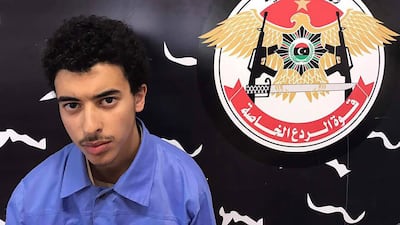While the second anniversary of the Manchester Arena bombing provided an opportunity this week for friends and family to mourn the victims, it was also a chance for survivors to ask one very pertinent question: why is one of the key suspects in the attack still being held in Libya?
From the outset of the investigation by British security officials, attention has focused on links between Salman Abedi, the terrorist who killed 22 people by detonating a suicide bomb during an Ariana Grande concert in May 2017, and Islamist extremists based in Libya.
They are especially keen to interview the terrorist’s brother Hashem Abedi after they discovered the two brothers travelled to Libya shortly before the attack took place. Salman returned to Britain just before the attack while Hashem remained in Libya.
The importance of Hashem to the British inquiry was highlighted early on in the investigation when Manchester authorities issued a warrant for his arrest and made a formal request for his extradition from Libya, where he is being held in custody under the auspices of the UN-backed Government of National Accord (GNA).
But despite constant assurances from GNA ministers – including prime minister Fayez Al Sarraj – that they would comply with the extradition request and hand Hashem over to the British authorities (most recently last month), the terror suspect remains in Tripoli, where he is under the protection of the GNA's interior ministry.
The constant prevarication has caused the British authorities immense frustration, causing one senior officer to complain that they had been “hoodwinked” by the Libyans.
Now the prospect of Hashem being extradicted to Britain, where detectives believe they have sufficient evidence to press murder charges, is likely to be delayed even further following reports this week that Turkey is promoting a major escalation in the conflict by shipping arms to the GNA, in violation of UN resolutions.
One of the GNA’s latest excuses for not processing the extradition request is the escalation in tensions following the recent military initiative launched by forces loyal to Field Marshal Khalifa Haftar to capture the Libyan capital.
The decision by Field Marshal Haftar to mobilise his Libyan National Army (LNA) was motivated in part by his desire to crush the Islamist groups that still control significant areas of the capital and appear to have little interest in supporting UN mediation efforts to bring political stability to this pivotal North African state.
Many of these Islamist groups receive support from foreign backers such as Qatar, which want to see Libya controlled by an Islamist regime similar to the Muslim Brotherhood government that briefly held power in neighbouring Egypt – with catastrophic results.
Now another foreign interloper in the form of Turkey is actively lending its support to the GNA’s Islamist backers by providing them with arms.
These include dozens of Turkish-made BMC Kirpi armoured vehicles, which were photographed earlier week lined up on the dockside at Tripoli port. Local media reports said the vehicles were destined for fighters allied with the UN-recognised government GNA.
In fact western intelligence officials believe the vehicles will be handed over to the Samud Brigade, led by Saleh Badi, an Islamist militia commander sanctioned by the UN and US for engaging in hostile acts that threaten the security and stability of Libya.
The suggestion that Turkish President Recep Erdogan might be supporting such groups makes sense because, in common with the Qataris, Mr Erdogan is keen to promote Islamist groups that have a similar political agenda to the Muslim Brotherhood.
According to a number of posts on social media websites this week, the Islamist militias linked with the GNA intend to deploy the vehicles, as well as the other arms shipments they have received, to bolster their efforts to defend Tripoli from the LNA.
Such arms shipments are banned by the UN, which is overseeing diplomatic efforts to unite the countries warring factions.
Instead, the arrival of fresh arms supplies is likely to result in a dramatic escalation in the conflict as both sides battle for control of the capital.
Reports that Turkey is actively supporting Islamist groups in Tripoli do not appear to have any way affected Field Marshal Haftar’s determination to prevail.
Following meetings in Paris this week with French President Emmanuel Macron, the general emphatically ruled out a ceasefire, telling French officials that he remained committed to ridding the capital of Islamist militias he claims have “infested” the UN-backed government. Consequently he remains committed to maintaining his military campaign to capture Tripoli, one that has resulted in the deaths of more than 500 Libyans, with an estimated 75,000 residents in the city forced to flee their homes.
Any escalation in the violence, moreover, means there is even less likelihood of Hashem Abedi being extradited to Britain, a situation that suits his Islamist captors.
One of the reasons Manchester detectives believe the Libyan authorities have been reluctant to co-operate is the information Hashem might provide about the involvement of himself and his brother in Islamist terror groups in Libya.
Ramadan Abedi, the brothers’ father, is a former member of the now defunct Libyan Islamic Fighting Group (LIFG), an Islamist organisation that campaigned for the overthrow of former Libyan dictator Muammar Qaddafi and his replacement by an Islamist government. Ramadan, like his sons, has continued to maintain links with Islamist groups since the demise of the LIFG and it looks increasingly as if, in order to prevent incriminating details of the role these groups may have played in the Manchester bombings, Islamist leaders are determined to prevent Hashem’s extradition to Britain at all costs.
Con Coughlin is the Telegraph’s defence and foreign affairs editor


